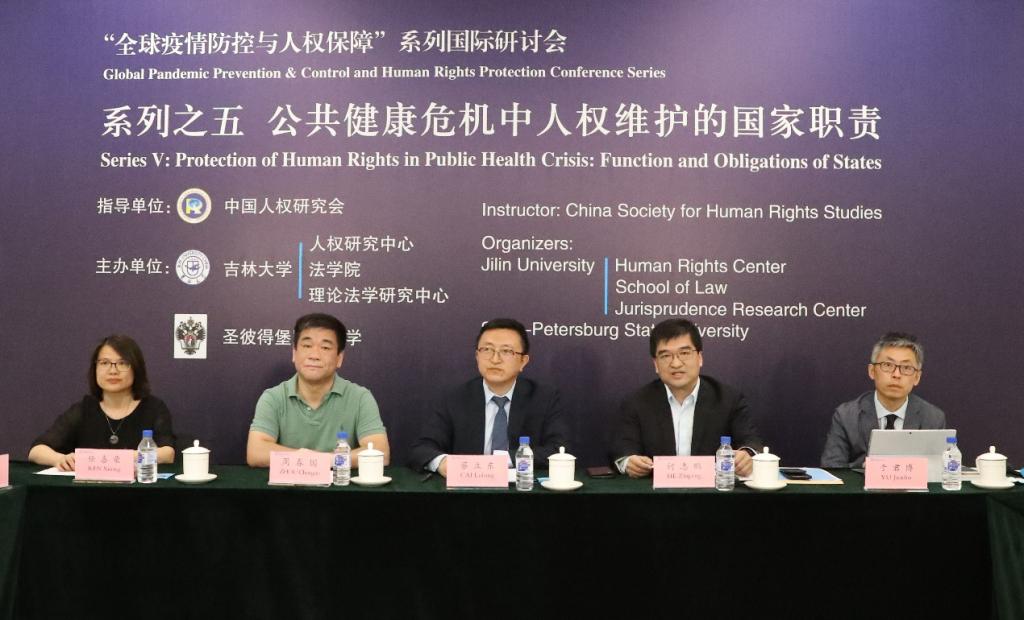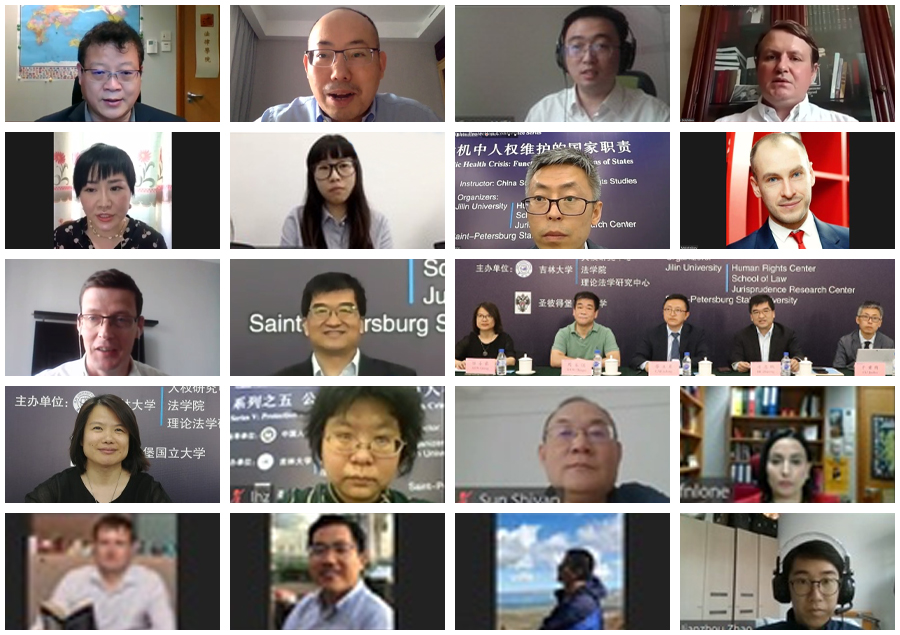On June 8, 2020, under the guidance of China Society of Human Rights Studies, organized by Jilin University Human Rights Research Center, Jilin University Schoolof Law, Jilin University Jurisprudence Research Center, and St.Petersburg State University, Russia, the conference “Protection of Human Rights in Public Health Crisis: Function and Obligations of States” was successfully held. It is the fifth conference of the “Global Pandemic Prevention & Control and Human Rights Protection Series”. The conference combined both online and offline attendance. Over 40 scholars and experts as well as media workers participated in online discussions, including Chinese and foreign experts from universities and research institutions such as Jilin University, St.Petersburg State University, Chinese Academy of Social Sciences, China University of Political Science and Law, Southwest University of Political Science and Law, Wuhan University, City University of Hong Kong, Moscow State University. More than 20 volunteers, including staff at Jilin University Human Rights Research Center, PhD students, and postgraduates from Jilin University School of Law, provided support for the conference. The opening ceremony was chaired by Professor He Zhipeng, Executive Director of Jilin University Human Rights Research Center and Dean of Jilin University School of Law.

Professor Cai Lidong, Vice President of Jilin University, addressed the meeting. He made the remarks that in the past six months, we had witnessed the global impact of COVID-19 on daily life and the challenges posed by public health to international and domestic society. Only at this time can we realize the great importance of protecting human rights in public health crisis. To effectively respond to the epidemic and protect people’s health and safety, all countries adopted a series of positive measures. Among them, there are also problems such as balancing various demands and responding to the challenges of unilateralism. Professor Cai Lidong called for social sciences researchers to explore the real issues reflected by COVID-19 outbreak by analysis and interpretation, because it would ensure the prosperity of our country and the well-being of our people from a longer-term perspective.

Professor He Zhipeng extended his thanks to China Society of Human Rights Studies for its support, and introduced the invited experts. He said that the white paper “Fighting COVID-19: China in Action” released on June 7th, recorded the hardship of China’s anti-epidemic campaign. China launched resolute battles in containing the spread of the virus and treating the infected at the same time, which exhibited Chinese People’s great power to fight the pandemic and their determination in building a community of common health for mankind with the rest of the world. Professor He Zhipeng’s remarks received positive responses from the conference participants.
Professor Zhang Wei, co-director of the Institute of Human Rights at China University of Political Science and Law, chaired the next part of the conference.
Professor Sun Shiyan, researcher from Institute of International Law and director of International Human Rights Law Department at Chinese Academy of Social Sciences, gave a speech on “Restrictions and Impacts of Epidemic Prevention and Control Measures on Human Rights - Based on International Human Rights Standards”. He remarked that the anti-epidemic measures would influence the assurance of some human rights, including the rights to education, life, and health. Regarding such restrictions, Professor Sun Shiyan suggested that emphases should be made both on effects of containment measures and balance between epidemic prevention and human rights protection. In the context of COVID-19, the national system of human rights law encounters new challenges, the key point is to secure human rights while prevent and control epidemic.
Associate Professor Fozia Nazia Lone from Law School of City University of Hong Kong gave a speech on “Human Rights Protection in Post COVID-19 Period: China’s Possible Role in the Cooperation Framework of Asian Health Based on Future Development”. In her view, Chinese government has proposed a global governance initiative for international cooperation, which means that China is willing to play a leading role in responding to future epidemics. As the response to epidemics requires effective cross-border cooperation and efficient international-domestic coordination, China’s position would change the existing global and regional structure of epidemic control. When most countries attach importance to self-protection, Chinese government’s attitude towards human rights protection—taking protection of people’s lives and health as its top priority and emphasizing the promotion of epidemic prevention through multilateral cooperation—has more progressive significance. She addressed that under the leadership of China in the future, a new Asian public health security system and a framework for responding to epidemics may be gradually established. The concept of “Community of Shared Future for Mankind” advocated by Chinese government will play a more active role in international health cooperation.
Professor Wang Jiangyu from Law School of City University of Hong Kong, also director of Chinese Law and Comparative Law Research Center, gave a speech on “Reshaping the Political and Commercial Relations in the COVID-19 Period”. He clarified that it was impossible to draw conclusions about whether East Asian political and commercial relations was reconstructed. Then he analyzed relevant policy models and changes of “government’s role in economic development”, discussed the political and commercial relations in common law countries, and introduced some policy models of economic development. Professor Wang Jiangyu commented on the impact on the political and commercial relations brought by COVID-19 through examples. He focused on the remedies of contracts which cannot be fulfilled due to COVID-19 outbreak, such as reducing rents, making loans to promote employment or investing in infrastructure construction.
Associate Professor Aleksei V. Dolzhikov from St. Petersburg State University made a statement on “Delegated Legislation and Fundamental Rights in Time of a Stress: the case of Russian Federation”. With introduction to Russian social background, he explained that emergency was one of the objects of proportionality principle in Russian constitutional law. Then he further illustrated the significance of people, people’s rights and people’s freedom in Russian constitutional law by an example of objection to a court’s judgement. He introduced a series of delegated legislative measures taken by the central and local governments in Russia since the outbreak of COVID-19, summarized relevant legal origins of fundamental rights and its restrictions, and elaborated its advantages and disadvantages as well. To conclude, he explained the constitutional restrictions on delegated legislation, including parliamentary supervision, judicial review, public participation, and other principles regulated by constitutional law.
Dr. Peng Qinxuan, research associate from Institute of International Law at Wuhan University, made a speech on “Is China Legally Responsible for the US Public Security Crisis? - Case Analysis of Missouri v. China”. In a question-oriented manner, she put forward and analyzed the following four key points: First, are the Missouri judicial officials qualified to investigate and prosecute China? Second, should the matter involved in this case be treated as a political issue rather than handled by judicial procedures? Third, is state immunity applicable in this case? Fourth, is China able to propose the “force majeure clause” in response? The four issues are based on international and domestic laws and regulations, and linked to each other. In the end, Dr. Peng Qinxuan concluded that Missouri prosecution cannot be successful.
Professor Yu Junbo from Jilin University Human Rights Research Center, and School of Administration made his remarks on “Production or Survival - Reflections on National Standards of Human Mobility”. He began with the concept of social distance in epidemic prevention and the concept of “mobility” related to home quarantine measures, and pointed out the contradiction caused by people’s aversion to “lack of mobility”. He explained that there are precedents of restricting mobility to ensure safety from the perspective of “national function of protection”, but from the perspective of “national function of production”, the rapid development of information technology and transportation technology has reduced the cost of capital, labor, and mobility of goods, so the traditional standards of mobility has been gradually replaced. He believes that the alienation of spatial mobility, social mobility and social economy constitutes three pillars of national development; the contradiction between socioeconomic differentiation and spatial mobility leads to central differentiation; the contradiction between social mobility and spatial mobility leads to populism, socioeconomic differentiation and social mobility leads to hierarchy.
Associate Professor Alexander Molotnikov from Moscow State University presented on the topic “New Technology and Human Rights: Legal and Ethical Issues”. He stated that the convenience and progress of new technologies could bring legal and ethical issues as well. During the COVID-19 period, big data technology is applied to monitor people’s track of movement, which promotes epidemic prevention and control effectively, but would pose a threat to people’s privacy. Therefore, as new technologies continue to develop, the balance between human rights and public interests should also be maintained.
Associate Professor Alexander Zezekalo from St.Petersburg State University made a speech on the topic “Knowledge is Power: National Bbligation to Provide Information”. COVID-19 not only challenges the protection of fundamental rights, but also urges countries to take corresponding measures to contain its spread. It also triggers discussions about the balance between positive obligations to protect public health and negative obligations to restrict fundamental rights. National obligation to provide information to the public aims at protecting people’s health and well-being and maintaining social stability, and it is especially of great significance during the COVID-19 pandemic.
To conclude, Professor Zhang Yonghe, Executive Dean of Institute of Human Rights at Southwest University of Political Science and Law, made comments on the speeches and summarized highlights of the conference.
The conference reviewed and analyzed the results of anti-epidemic battles from the perspective of functions and obligations of states. The attendees highly recognized achievements made by the Chinese government, and positively evaluated the significant roles of science and technology, human rights concepts and international cooperation in epidemic prevention and human rights protection.